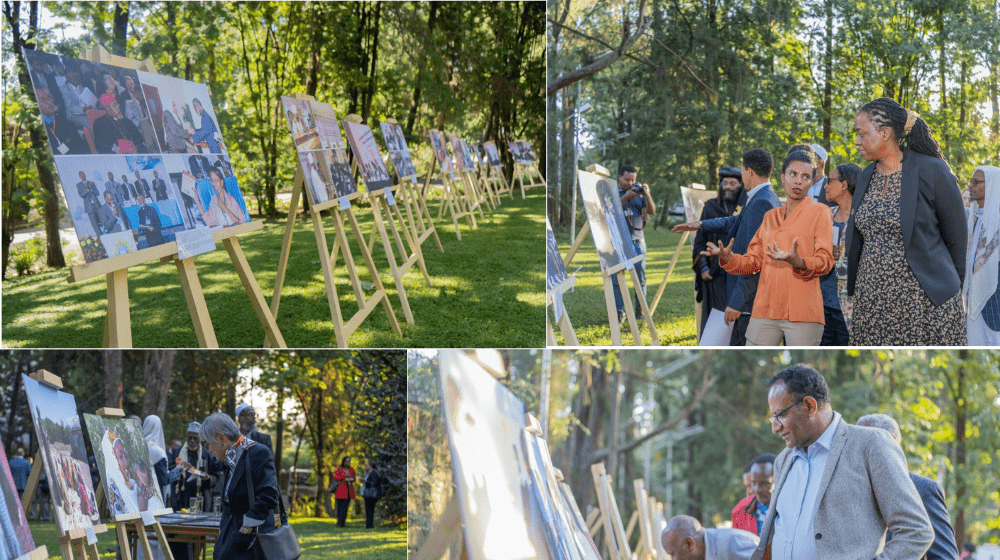Religious leaders are at the forefront in the fight to end gender-based violence and harmful practices against women and girls.
As part of the 16 Days of Activism against gender-based violence, UNFPA, UN Women, and the Norwegian Church Aid (NCA) organized a photo exhibition on December 2 to recognize the role of faith-based organizations in the fight against gender-based violence and harmful practices against women and girls. The exhibition featured 40 photos and was held at the residence of the Norwegian ambassador in Addis Ababa.
Dr. Catharine Sozi, UN Resident and Humanitarian Coordinator in Ethiopia, in her keynote address at the opening of the exhibition said that religious leaders are key players in the fight for equality and in the fight against violence. “You are the custodians of our culture and tradition. As we continue to see slow progress, we know you have a critical role in shifting deep-rooted beliefs that justify the perpetuation of these harmful practices,” she stated. She added that faith institutions are in a position to influence the community to bring gender equality in culturally appropriate manners as they are insiders.
The exhibition was attended by religious leaders and partners, who shared their experiences in support of gender equality and protection of women and girls from violence.
Speaking at the event, Sartu Shamsuddin Ahmed, a women's rights activist who established the first Women's Desk at the Islamic Affairs Supreme Council in Ethiopia, said religious leaders play a significant role in the fight against gender-based violence and harmful practices by making it clear that they are not sanctioned by religion. "There was so much silence and shame on the issue. Women and girls didn't have a space to share their stories in religious spaces.” “It was a dream come true for us to establish a desk at the council to help women seek support and share their stories," she added. She noted that the initiative empowered so many women to come forward and seek psychosocial and health support indicating that a team of volunteers has been set up to advise and encourage women to pursue legal remedies.
The photo exhibition event also served as an occasion to reaffirm commitments of faith-based institutions organizations in addressing GBV and Harmful Practices in Ethiopia.
Megabit Haimanot Kesis Netsanet Akleweg, Deputy Head of the Ethiopian Orthodox Church in Sidama Region, believes that collaborations among stakeholders and inclusion of religious institutions are the path to progress. "We have done so much, but we also have a long way to go. We are advisors and mediators in family issues, and we have an immense responsibility to ensure the sanctity of humanity,” he said. He mentioned that currently regular training and awareness creation sessions are being provided for priests and congregation leaders so that they are aware and sensitive to the issue of violence and how it damages women and society. “We want them to include it in their teachings in church and when they have a one-to-one with their God sons and daughters. We are also focusing on smaller communities to have in-depth discussions on the issues," he said.
Megabi Haimanot Kesis Netsanet Akleweg is a vocal advocate for women’s equality for several years and is currently working to institutionalize the issue by including it in spiritual colleges and schools in his region. "It's been part of the curriculum in our regional college, and we have seen results. It gives me hope to see families choosing not to circumcise their daughters or marry off them at a young age, regardless of social pressure. We should capitalize on this and push forward so that all girls enjoy such freedom and protection" he said.
Sr. Eunice Moraa, from the Congregation of Franciscan Sisters, supports women who face severe complications during childbirth due to FGM. "FGM is a big problem in the community I serve. We see many complications including excessive bleeding and uterine and vaginal prolapse. Many women hide this for years, even when they can't sit or walk properly. They are shy, and are often accompanied by an older man when they come to see us" she said.
She notes that the big congregation at her Church is the best avenue to pass messages. “We invite the elders of the Church to teach and speak on the issue because elders decide what culture continues. I believe faith institutions have a big opportunity to change communities for the better" she added.
The photo exhibition moved to the ECA compound as part of events for 16 Days of Activism against gender-based violence, including the World AIDS Day and was visited by the UN community and invited guests.


